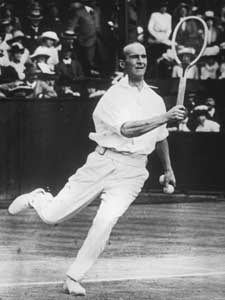Tennis star’s former office, Llandudno
![]() Tennis star’s former office, 17 Trinity Square, Llandudno
Tennis star’s former office, 17 Trinity Square, Llandudno
 Solicitor James Cecil Parke, who worked in this building, captained the Ireland rugby team and won an Olympic silver medal for tennis – among many other achievements.
Solicitor James Cecil Parke, who worked in this building, captained the Ireland rugby team and won an Olympic silver medal for tennis – among many other achievements.
He was born in Clones, County Monaghan, Ireland, in 1881 and quickly excelled at sports including golf, cricket, rugby and tennis. He was a chess prodigy at nine years old. While studying law at Trinity College, Dublin, he received his first cap for Ireland in rugby. From 1903 to 1907 he was a stalwart of the Irish midfield. He captained the side twice.
He won many major tennis tournaments. He was singles champion of Europe in 1907. He won: Olympic silver in 1908, men’s doubles; the Australian men's singles and doubles in 1912; and the Wimbledon mixed doubles in 1914. He helped Britain win the Davis Cup in 1912 by beating Australasia. At the outbreak of World War One he ranked sixth in the world.
 He joined the Leinster Regiment in September 1914, was wounded at Gallipoli in 1915 and transferred to the Essex Regiment as second in command of the 10th Battalion, attaining the rank of Major. By September 1918 he was in France, commanding the entire Battalion. He was wounded again, and Mentioned in Despatches.
He joined the Leinster Regiment in September 1914, was wounded at Gallipoli in 1915 and transferred to the Essex Regiment as second in command of the 10th Battalion, attaining the rank of Major. By September 1918 he was in France, commanding the entire Battalion. He was wounded again, and Mentioned in Despatches.
He returned to tennis in peacetime. He reached the Wimbledon men’s doubles final in 1920, when he ranked fourth in the world – aged 39. Later that year he came to Llandudno to practise law, joining Messrs Chamberlain and Johnson four years later as a partner in this renowned local business.
Major Parke helped establish the municipal tennis courts on Queen’s Road, Craig y Don, in 1931. He chaired the North Wales Golf Club at West Shore and was an avid supporter of the Scout movement, being both the Local Commissioner and Secretary of the Llandudno Association.
He died suddenly on 27 February 1946, after collapsing on Mostyn Street. He was buried on the Great Orme. His son Arthur was a solicitor at the same practice. Major Parke’s nephew Thomas, who lived with the family, was killed in the Second World War. Our page in his memory is here.
Today the solicitors’ practice is known as Swayne Johnson.
With thanks to Adrian Hughes, of the Home Front museum



